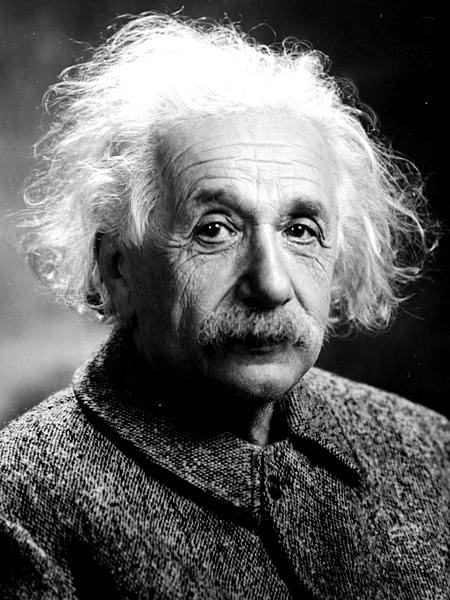 |
| Albert Einstein (Wikipedia) |
Note: His bushy hair and soulful eyes are as familiar as his famous formula. But do you really know what it means? Find out here!
Get Ready: Einstein's famous formula contains three letters: E, m, and c. Do you know what any of them stands for?
Perhaps no scientist in history has achieved the public recognition of the German Albert Einstein (1879-1955). His name and face (not to mention his hairstyle!) seem to be known around the world.
As familiar as his face is, though, few of us really understand his insights. "The world's most famous equation"--E=mc2--is almost as well-known as his appearance, but being able to say it is about as far as most of us can go.
The formula is part of Einstein's "theory of relativity." It demonstrates the equivalence of energy (E) to mass (m) saying that the amount of energy (in Joules) in any amount of matter is equal to the amount of matter (in kilograms) times the speed of light (c) squared. (A Joule is a measure of energy, basically the amount needed to move something one meter.)
The theory remained controversial for many years; his 1921 Nobel Prize in Physics did not include any citation to relativity at all.
Einstein was born in what was then the Kingdom of Württemberg. His father was a businessman and engineer, who made electrical equipment in Munich. Though a non-observant Jew, Einstein attended Catholic school for three years, and then a public primary and secondary school for seven more years.
After his father's business failed, the family moved to Italy. Albert stayed on a little longer to finish at the German school, but noted later that he hated the "rote learning" there. He joined his family in Italy at the end of 1894.
At age 16, he entered a polytechnic school in Zurich, Switzerland, where his grades were good but he did poorly on examinations. There he met his future wife.
After having two children with his first wife, he divorced her in 1919. He remarried almost immediately (to a woman he had started an affair with in 1912) and in 1933, the couple immigrated to America. His second wife died there in 1936.
During World War II, Einstein contributed to the Manhattan Project, which developed the atomic bomb for America. Some of his public reputation is based on his later opposition to nuclear weapons.
Much has been made of Einstein's thoughts on religion and philosophy. Like Mark Twain and Abraham Lincoln, he often has things attributed to him that he never said. But he did, in fact, say some important things on subjects outside of science, and his thoughts are worth reading.
--------Read more: https://en.wikipedia.org/wiki/Albert_Einstein
Practice: Match the term to its definition below:
- attributed
- controversial
- equation
- equivalence
- formula
- immigrated
- insights
- non-observant
- opposition
- rote
- by memorization, without understanding
- a symbolic expression of a rule or principle
- assigned to; credited to
- condition of being the same
- a mathematical sentence in which both sides are balanced
- moved into another country
- objection; antagonism
- not accepted by all; causing disagreement
- ideas; discoveries
- not following the practice (of a religion)
Answers are in the first comment below.
Submitted to the Shenzhen Daily for May 11, 2015


Answers to the Practice: 1. c; 2. h; 3. e; 4. d; 5. b; 6. f; 7. i; 8. j; 9. g; 10. a
ReplyDelete